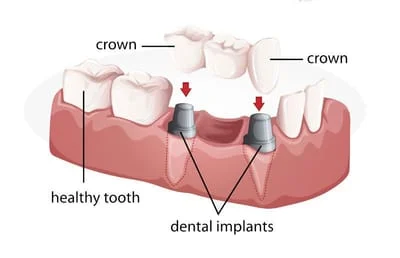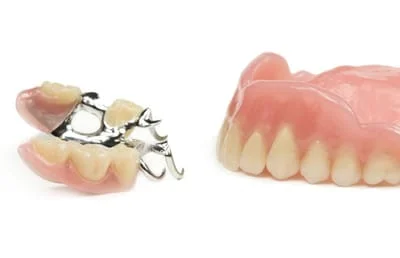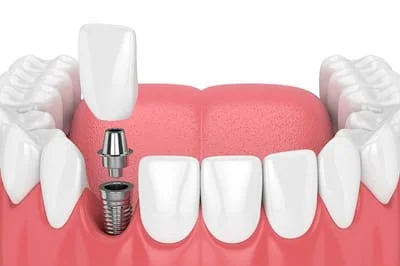When it’s not addressed, tooth loss can have devastating consequences for your smile and your whole body. Fortunately, patients have multiple options for replacing missing teeth to reduce the long-term effects of tooth loss.
There are different considerations that patients will want to weigh when selecting a tooth replacement option. Different characteristics will be important for different patients, so it’s important to have as much information as possible when making your treatment decision.
The best first step to begin to restore a smile affected by tooth loss is with a no-obligation consultation at Smile Naples. At this appointment, Dr. Dennis will thoroughly evaluate your case and educate you on your treatment options.
Replacing Missing Teeth: What Are My Options?
Patients have the following options for replacing missing teeth:
Fixed Dental Bridges
Consists of a pontic (artificial crown) that is anchored to dental crowns placed on adjacent teeth. Fixed dental bridges can replace a single tooth or a small number of missing teeth in a row.
Partial Dentures
A removable appliance that attaches to the remaining natural teeth using metal clasps. Partial dentures are typically used to replace multiple teeth in an arch.
Full Dentures
A removable appliance that is custom-designed to fit a patient’s unique mouth structure and replace an entire arch of missing teeth.
Dental Implants
Small cylinders made of titanium – a material that bone tissue can bond with -are surgically inserted into the patient’s jaw to replace the roots of missing teeth. Dental implants can support a single crown, dental bridge, or full denture, depending on the patient’s needs.
There are significant differences between these options, affecting everything from the treatment process to the anticipated longevity of the appliances. Be sure to research all of the options thoroughly before deciding on one of them.
Dental Implants Vs. Conventional Restorations
Dental implants represent a significant advance in modern dental technology, as they give patients an option for a structurally complete tooth replacement consisting of both an artificial root and crown. In contrast, conventional dental bridges and dentures replace only the crowns of the missing teeth.
The difference between replacing a root and a crown or a crown alone is significant and has wide-ranging effects, such as:
Durability
Dental implants prevent the jawbone atrophy that follows tooth loss and progresses when a conventional appliance is used to replace the missing teeth. That jawbone erosion causes traditional bridges and dentures to lose their fit eventually, but that is not an issue when an appliance is supported by dental implants.
Comfort
Dental implants feel more lifelike and natural to patients.
Convenience
Dental implants eliminate the need for denture adhesives or specialized tools to brush or floss surrounding natural teeth.
Functionality
Dental implants tend to be more effective at chewing because they can tolerate fairly strong chewing forces thanks to the bond between bone and dental implant.
Patients should be aware that dental implants do require a surgical procedure to be placed in the jaw. While it is an outpatient procedure, some patients may be uncomfortable with a more invasive intervention.
Considerations For Tooth Replacement
Choosing between dental implants and standard tooth replacement appliances is a unique endeavor for each patient facing tooth loss. The following factors can influence the patient’s decision:
Bone Quality
To get dental implants, patients must have sufficient bone tissue at the proposed dental implant site to support osseointegration. If bone loss has occurred, the patient may need to consider either a bone graft to supplement the bone at the site or a conventional tooth replacement appliance.
Oral Health and Overall Health
Active oral disease, such as periodontal disease, can be a barrier to dental implant placement. Additionally, patients must be in good enough health overall to tolerate a surgical procedure and heal completely afterward.
Costs
The upfront costs associated with dental implants are higher than those of conventional dental bridges and dentures. However, conventional dental bridges and dentures may need to be replaced many times, which increases the overall costs over the lifetime of these treatments.
FAQs
What is a dental implant?
A dental implant is a small cylinder made of biocompatible titanium. This means that bone tissue is capable of forming a bond with it. Over several months after dental implants are surgically placed in the jaw, they are osseointegrated, becoming a fixture in the patient’s jaw. Dental implants function like prosthetic roots and support a crown, bridge, or denture to restore a patient’s smile after tooth loss.
What is a partial denture?
A partial denture is an appliance made of acrylic and metal that replaces several missing teeth but not an entire arch. Partial dentures are secured to natural teeth using metal clasps, and they can easily be removed by patients as needed.




